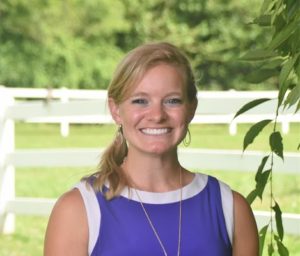Recovering from an eating disorder requires a multi-disciplinary team including a medical doctor, psychiatrist, therapists, family members, and a Registered Dietitian (R.D.) who specialize in treating eating disorders. The client-dietitian relationship is invaluable as it helps to guide clients through understanding a meal plan and the nutritional needs of someone recovering from an eating disorder.
As the Registered Dietitian at Selah House, Shelby Duncan provides education and counseling in all areas of food. She helps clients understand the biological value of nutrition; the emotional and psychological component of food; the overall experience of eating; the nuts and bolts of meal planning, grocery shopping, and food preparation; and how nutrition applies to physical activity.

She shares, “I have the opportunity to practice real-life application challenges with each of my clients, including a meal challenge at a local restaurant, a grocery challenge, a weekly meal planning group with clients in the partial hospitalization program, and a weekly cooking group in which we prepare lunch and engage in fellowship.”
Shelby also leads a weekly nutrition group with discussion around nutrition topics that serve to help the clients increase their understanding of their relationship to food and how they can move forward in their recovery. Discussion topics include, but are not limited to, macronutrients, intuitive eating, navigating holidays, portion sizes and strategies to create appropriate meals, anticipated challenges after treatment, identifying triggers for eating disorder thoughts and behaviors, and honoring nutritional needs while coping with emotions.
At Selah House, we focus on the nutrition philosophy that all foods can fit in balance, variety, and moderation in one’s overall diet. This means that there are no “good” foods or “bad” foods, but rather foods that are chosen and incorporated based on taste preference, hunger and fullness cues, and nutritional value. We teach Intuitive Eating at Selah House, an evidence-based practice detailed within “Intuitive Eating: A Revolutionary Program that Works” by Evelyn Tribole, MS, RD and Elyse Resch, MS, RD, FADA.
The principles are as follows:
- Reject the Diet Mentality
- Honor Your Hunger
- Make Peace with Food
- Challenge the “Food Police”
- Respect Your Fullness
- Discover the Satisfaction Factor
- Honor Your Feelings Without Using Food
- Respect Your Body
- Exercise- Feel the Difference
- Honor Your Health
Each client will gain an understanding the ten principles of intuitive eating but will be a beginner at intuitive eating when they commence from Selah House. “As they learn the ten principles of intuitive eating and begin regaining trust with their body, they have the foundation they need to continue with their outpatient dietitian in becoming an intuitive eater,” says Shelby. This is an exciting part of the recovery journey as clients begin to improve their relationship with food and body, and are empowered to reclaim their taste preferences.
As the dietitian, Shelby plays a vital role in the recovery process. “While I love all the components of my work, my favorite aspect is being a part of a multidisciplinary team and walking with my clients as they overcome their fear of food and recognize that nutrition is necessary for the greater purposes that God has called each woman to in her own life.”
Our clinicians have an incredible opportunity to witness healing and restoration– physically, mentally, emotionally, socially, and spiritually – for so many women that come through the doors of Selah House, making this a unique and distinctive place to work.

 Call
Call

